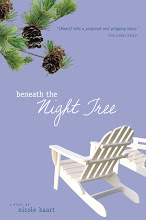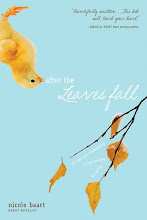Tuesday, April 27, 2010
Wisdom from Wally Lamb
So last week y'all freaked out that I went to a social media concurrent session instead of listening to Wally Lamb. Well, the good news about a conference like the Festival of Faith and Writing is that most of the speakers present more than once. So... I did get a chance to hear Wally Lamb speak. And he was wonderful.
The title of his talk was There but for the Grace of God. It was entertaining, filled with humble wisdom, and sprinkled with stories from his own life and experiences. I like to take notes when I attend sessions like this, but I have to admit that my scribbles from Wally's speech are few and far between. I doodled a lot. Which does not mean I was bored. Quite the opposite, actually. Are there any doodlers out there? Often the more my pen moves, the more I'm absorbing. Seems counter-intuitive, but it works for me. That's why I allowed my high school students to doodle in my classes (as long as they left their drawings behind when the bell rang).
Thankfully, in spite of my incessant doodling, I did get down three important gems from Wally's talk. I believe they're worth sharing.
1. Don't write for an audience, write for yourself.
This was an interesting statement for me to hear because it seems like lately people seem much more concerned with pacifying an audience. Gathering a tribe. Building a platform. You get the drift. But Wally suggested that if you aren't writing something that touches you deeply, that inflames your passion or makes you feel something at your very core, you might as well quit before you start. Makes sense to me. And yet I can't help believing that his assertion is only a part of the whole. If I only wrote for myself, my books would be long, rambling tomes that lean heavily toward the sickeningly literary, flowery prose-ish, "deep" stories about love and longing and loss. Gag. I write what I'm passionate about, but I do try to keep an audience in mind. If I didn't, the only brain that would be even remotely edified by my writing would be my own.
What do you think? Write for an audience? Or write for yourself?
2. You will never tell a completely original story.
Of course, I've heard this before, and it always leaves me with mixed emotions. On one hand, I'm comforted that "there is nothing new under the sun." We are all a part of this universal story, this beautiful narrative that began with the breath of God and will end with the same. But the thought that I'll never tell a completely original story also makes me a little sad. I realize that my books will always be my own because they will bear the mark of my individuality, but wouldn't you just love to tell something shocking? Unexpected? Fresh? I would. And maybe that's part of the allure of being an author for me: the constant, relentless, exciting search for something that feels like a discovery.
Do you long to tell an original story? Why or why not?
3. When you write, you must move beyond yourself.
People want to read books about heros, about people who are searching for answers, for truth, for something bigger and better around the next bend. And in order for that hero to find what he's looking for, he has to leave home. Therefore, in order for you to help your hero find what he's looking for, you have to leave home. You have to move beyond yourself! Look at life from another perspective. Put yourself in someone else's shoes. Experience something you've never experienced before. What a great thought! And yet, I've often been told to write what you know. I think I do both. I hope I do both.
Do you move beyond yourself when you write? Or do you write what you know?
Your turn: I'm still chewing on Wally's advice, and I'd love to hear what you have to say. Pick one of his suggestions (or all three!) and respond to the question I posed.
Subscribe to:
Post Comments (Atom)











That was one of the talks I was most sad to miss (and he lives in my state!).
ReplyDeleteI've read the same wisdom behind number one twice in the last couple of days, so, you got it--it's sticking.
And I believe it. I've never been a write for the market type of gal, but I like how you added that you keep an audience in mind. I think there's a difference in trying to please an audience while we write and keeping them in mind.
And yes, I doodle and this is the first time I've read someone explain what goes on with me when I do it. Things seep in, that is except when I used to do it in h.s. math classes.
~ Wendy
I agree completely with you on number one. I have to be passionate about what I'm writing...otherwise I won't sit my butt in the chair and spend all that time. But I also have to consider my audience. I also, above me or my audience, want to consider God. What story is He placing on my heart?
ReplyDeleteOf course, I'd love to tell an original story. Love. to.
I write both what I know and what I don't know. What I don't know requires lots of research. Like right now, I'm reading all about the modeling industry, which is very fascinating.
His advice makes a lot of sense to me, too. I think a lot of his points make you strive for balance in your writing. I would love to write a completely original story but I know that the elements of it will come from other things. However, the struggle to balance everything shouldn't take away the joy of the craft itself. I love writing and exploring the ways we all tell stories. How we put it all together makes us individual, and I think that's awesome. (I hope my rambling makes sense, haha.)
ReplyDelete~Brandi
Wendy, I'm glad to hear I'm not the only doodler out there! If there is a pen in my hand, you can bet it's moving...
ReplyDeleteKatie, you're researching the modeling industry? How cool. I absolutely loved The Devil Wears Prada (both the book and the movie), but I wonder how true that is to life?
Brandi, you're not rambling! I totally know what you mean. Sometimes I think we just have to get the story down, and then worry about the technical elements later. And you're right, our individual voices will come through in our writing no matter what.
I agree with number one. It's important to keep an audience in mind, but at the same time, I am a complete advocated of writing what is important to you first over that of your audience. If you wrote ONLY what audiences wanted vampire novels would be the only things left to read about.
ReplyDeleteI also have felt somewhat disheartened by never being able to tell an original story; and because people say you will never be able to tell an original story, it makes me wonder why some critics praise authors for being "original." Isn't everything, then, somewhat cliche?
And lastly, as far as moving beyond yourself, I have often wondered if maybe I should write my own book from the perspective of three significant characters rather than just one, or from just one of the other characters' perspective. It is something I will look more into after exams, which will be halfway done by tomorrow's end. :)
Thanks for sharing these! Kudos to you and Wally!
Lauren, Ha! You're so right. Vampire novels would be the only thing left. And if that was the case, I might have to strangle myself with a "Team Edward" t-shirt. Or "Team Jacob." Either way.
ReplyDeleteI hear you about everything being cliche... and I think the trick is to take the everyday, the mundane, and make it extraordinary--to avoid the cliche, even though what you're writing about might fit every expected stereotype. Love at first sight is a totally cliched notion, but I adored hearing Marisa de los Santos write about it in "Love Walked In." Know what I mean? Hmmm... you've given me something to think about.
Good luck with exams!!!